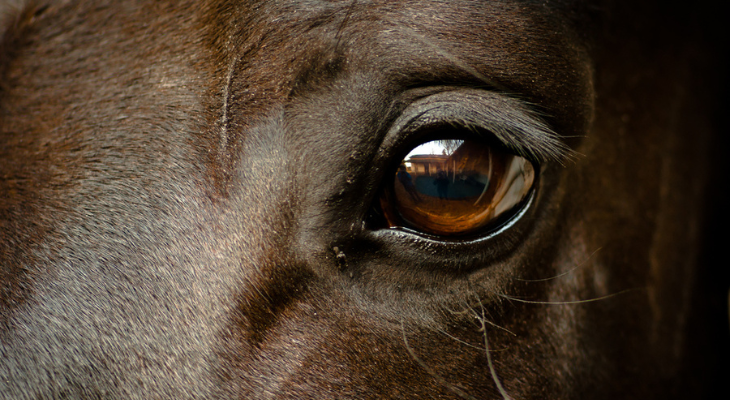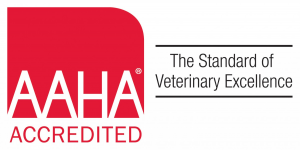December Newsletter: The Importance of Eye Exams for Horses
- Created in Newsletter Library

The Importance of Eye Exams for Horses
Is an equine eye exam on your calendar for the upcoming year? Just like people, horses need regular eye exams to ensure their vision remains clear and sharp.
How Exams Protect Your Horse's Eye Health
Wouldn't it be nice if your horse could tell you that its eyes are dry or painful or that the world has started to look a little blurry? Since eye and vision changes aren't always obvious, exams provide an important way to detect diseases and conditions that affect the eye, including:
- Corneal Ulcers and Abscesses. Horse's protruding eyes are particularly susceptible to injuries. A small scratch from an overhanging branch can quickly turn into a painful infection that threatens your horse's vision. Injuries that affect the cornea, the clear rounded tissue over the iris and pupil, are especially concerning. Shallow ulcers may not be noticeable but can affect your horse's vision if scars form during healing. Eye exams help your equine veterinarian spot scratches and ulcers so that treatment can be provided before these issues can interfere with vision or become infected. Corneal stromal abscesses occur in the deeper layers of the cornea, unlike ulcers that affect the outer layer. These bacterial or fungal infections can cause significant pain and may require surgical treatment.
- Equine Recurrent Uveitis. Equine recurrent uveitis (ERU) is the most common cause of blindness in horses, according to UC Davis Veterinary Medicine Center for Equine Health. Also called "moon blindness," the condition triggers inflammation in the middle of the eye and can occur repeatedly. Signs of ERU may include eye redness, squinting, and tearing. UC Davis notes that Appaloosa horses are eight times more likely to develop the condition and become blind, leading veterinarians to suspect a genetic component plays a role in the development of the condition. Prompt treatment reduces inflammation and tissue damage and lowers the risk of permanent vision loss.
- Corpora Nigra Cysts. These cysts form in your horse's iris along the top of the pupil. Although the cysts are usually harmless, they can interfere with vision if there are large numbers of them. Spooking or head shaking can occur if your horse experiences vision problems due to these painless cysts. Corpora nigra cysts can only be detected using bright lights during a vision exam. Laser treatment can deflate the cysts if they cause blind spots in your horse's vision.
- Dry Eye. If you've ever had dry eye, you know how uncomfortable the condition can be. Your horse can also suffer from dry eye if it doesn't produce enough tears or the nerves that control tear production are damaged. Untreated dry eye can lead to corneal ulcers and infections. Dry eye treatment involves putting artificial tears and ointments in the eyes or giving your horse steroid medication.
- Skin Cancer. Your equine veterinarian also looks for signs of skin cancer during the eye exam. The cancer can affect your horse's eyes or eyelids. Since skin cancer signs are often subtle, they can be missed by horse owners. Early treatment of skin cancer is essential to protect your horse's vision.
- Cataracts. Cataracts happen when the clear lens inside the eye becomes cloudy. Cataracts can be present at birth or occur at any point in your horse's life. Surgery may be needed to remove large cataracts, but treatment usually isn't required if cataracts are small and don't significantly interfere with vision.
What Happens During an Eye Exam?
Before examining your horse's eye, your equine veterinarian will ask you if you've noticed any changes in your horse's eyes or behavior. He or she will carefully examine the eyes, looking for signs of inflammation, swelling, injuries, infections, and growths. The exam will also include a few tests to check your horse's vision. Your equine veterinarian may shine a light in the horse's eyes to check that the pupils constrict normally or evaluate your horse's response to movement. Special instruments, such as an ophthalmoscope or slit-lamp, may be used to assess the health of your horse's retinas, optic nerves, or corneas.
Your equine veterinarian might recommend sedating your horse during the exam and may use an anesthetic injection to keep your horse's eyelids from moving while examining the eyes.
Is your horse due for an eye exam? Contact the equine veterinarian to schedule an appointment.
Sources:
UC Davis Veterinary Medicine Center for Equine Health: Equine Recurrent Uveitis, 3/3/2020
https://ceh.vetmed.ucdavis.edu/health-topics/equine-recurrent-uveitis
Horse & Hound: Examining the Equine Eye, 11/7/2020
https://www.horseandhound.co.uk/plus/vet-clinic/equine-eye-examination-729484
Cornell University College of Veterinary Medicine: Assessment of Vision and Common Eye Problems in Horses, 5/15/2023
https://www.vet.cornell.edu/news/20230515/assessment-vision-and-common-eye-problems-horses
American College of Veterinary Ophthalmologists: Eye Exam in Horses – What to Expect?, 5/26/2020
https://www.acvo.org/tips-treatments-tricks/eye-exam-in-horses-what-to-expect


